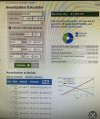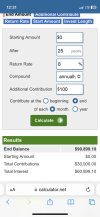We just made a final payment to an auto loan. With the extra freed money each month, wife want to put it in extra mortgage payment so we can payoff the mortgage faster. I was thinking of putting it in college saving for the kids or investments.
Because unless I'm missing something, in a typical mortgage you are paying off the interest first, then the principle. That the bank make most of the profit from the first 10-15 years of a 30 years mortgage.
Example: let say your mortgage is $1200 a month, but you paid an extra $100 a month so at the end of the year, you pay an extra $1200 to the principle balance. That would only cut your 30 years load to 29 years and 10 months. Because that extra payment went to the BACKEND principle. Because right now, that $1200 you pay is mostly $900 interest and $300 principle. That it at the 15 years mark is when you are paying 50/50 to interest and principle.
So anyway, since we owned our house for 5 years already, I dont see the benefit of small payment to our principle. I see the money better used elsewhere. Especially since the $1200 payment today would be valued at $1000 in 20 years due to inflations.
Its not such a big decision that I would contact a financial adviser. Just wondering if you folks have any experiences in this topic. Thank you.
Because unless I'm missing something, in a typical mortgage you are paying off the interest first, then the principle. That the bank make most of the profit from the first 10-15 years of a 30 years mortgage.
Example: let say your mortgage is $1200 a month, but you paid an extra $100 a month so at the end of the year, you pay an extra $1200 to the principle balance. That would only cut your 30 years load to 29 years and 10 months. Because that extra payment went to the BACKEND principle. Because right now, that $1200 you pay is mostly $900 interest and $300 principle. That it at the 15 years mark is when you are paying 50/50 to interest and principle.
So anyway, since we owned our house for 5 years already, I dont see the benefit of small payment to our principle. I see the money better used elsewhere. Especially since the $1200 payment today would be valued at $1000 in 20 years due to inflations.
Its not such a big decision that I would contact a financial adviser. Just wondering if you folks have any experiences in this topic. Thank you.



